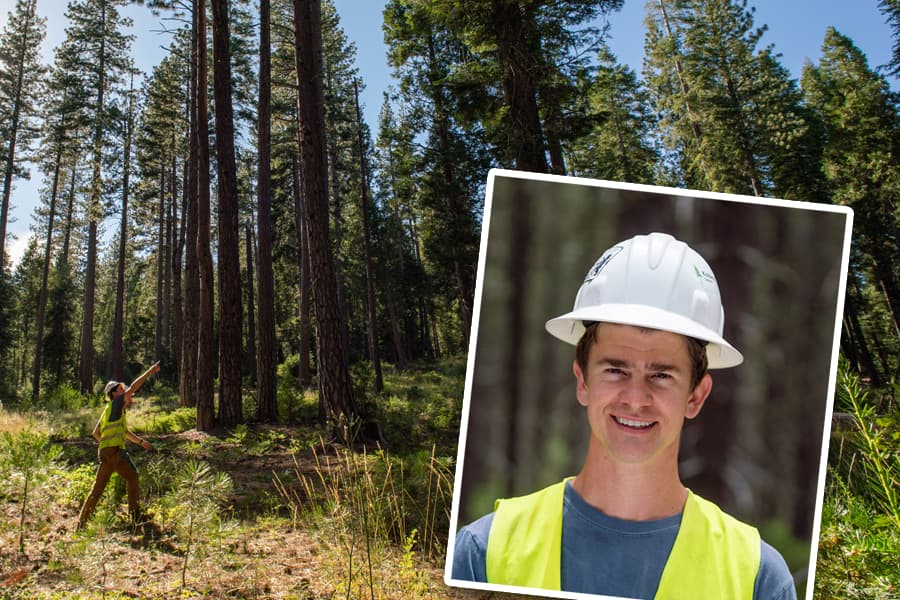Timber Technologist SCS Alum Merritt Jenkins Uses Robotics To Restore Forests
Kelly RemboldTuesday, August 27, 2024Print this page.

School of Computer Science alum Merritt Jenkins needed to learn about the logging industry — and the West Coast was the place to do it. So in 2022, he and his wife moved from Boston to a small town on the edge of the Stanislaus National Forest in California.
Jenkins is the chief executive officer and co-founder of Kodama Systems, a startup that works to improve safety and productivity in forest management operations.
In California, he conducted field research for Kodama's site connectivity and teleoperation platforms. When used together, the platforms allow operators to control a logging skidder from a remote location and automate certain tasks in the logging process.
"I spent every day with a logging operation," said Jenkins, who earned a master's degree in robotics in 2017. "I started to understand how these operations are structured and built a thesis that there was an opportunity for teleoperation and autonomy."
Early Learning
Jenkins grew up in the suburbs of Philadelphia, but spent his summers exploring the outdoors in the Endless Mountain region of Pennsylvania.
"I think it was hardwired in me from birth," he said. "My favorite activity as a kid was digging in the dirt. I just loved being outside."
In seventh grade, he received a gift that set him up for his future career.
"My mom gave me an Army survival handbook for my birthday," he said. "That became like my bible for a while."
Jenkins' love of the outdoors led him to Dartmouth College, where he earned dual bachelor's degrees in environmental studies and mechanical engineering — the latter a last-minute addition to his education.
"I was learning a lot about environmental problems and not a lot about the solutions to those problems," he said. "So at the very beginning of my senior year, I accelerated my classes and added on a second major."
Robotics Roadmap
After graduating from Dartmouth, Jenkins took a job as a mechanical engineer at QBotix, a robotics firm focused on actuating solar panels. He enjoyed it so much that he decided to pursue a master's degree in robotics.
"I got drawn into robotics and worked there for almost three years," he said. "I had amazing mentorship and that's what motivated me to go to grad school."
Jenkins was accepted to CMU's robotics program, where the roots for Kodama began to grow. He worked with Research Professor George Kantor, who required his students to build a robot and operate it in the field. Merritt and his lab partner developed a robot to automate phenotyping of sorghum and spent two summers testing it in South Carolina.
"It was a good experience in the hybrid of academia," he said. "We were doing real research, building up 3D models of plants using stereo vision. I was extracting and identifying sorghum stalks. We were applying machine learning to it."
That experience had a powerful impact on his career.
"It was my true introduction to agricultural robotics, and I've been in that space for the past decade," Jenkins said. "In that decade, I've seen a ramp-up in the number of startups and the amount of funding exits in the agricultural robotics space. And I've wanted to start a company for a while. It's been a goal of mine."
He enrolled at the MIT Sloan School of Management, where he received an MBA and took the first steps toward starting Kodama.
"I was investigating sectors that intersect with climate change but don't get a lot of attention right now," he said. "That's where I stumbled upon forest management and realized it's a sector of agriculture few roboticists are paying attention to and it's a hundred-billion-dollar market in the world."
He connected with two venture capital firms, and Kodama Systems began to grow.
Futuristic Forestry
After he moved to California, Jenkins got a closer look at the daily challenges loggers face. Logging mitigates wildfire risks by removing hazardous and excessive growth from targeted areas. Loggers spend 10 to 12 hours a day operating heavy machinery and can travel up to three hours round-trip to reach job sites in remote locations. It's physically demanding and reported to be the most dangerous job in the country.
"The No. 1 problem I heard from all of these loggers is that it's a struggle to find reliable labor," Jenkins said. "There are half as many loggers today as there were 20 years ago."
After learning about these challenges, Jenkins knew Kodama was on the right track with its vision.
"On the technical side, forestry is not the easiest sector for teleoperation," he says. "But it creates a ton of value for the customer, so that's why we've chosen to focus on it."
Aaron Aupperlee | 412-268-9068 | aaupperlee@cmu.edu
